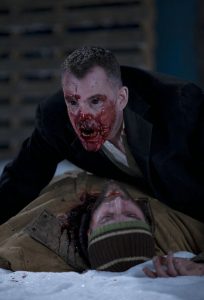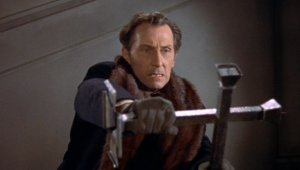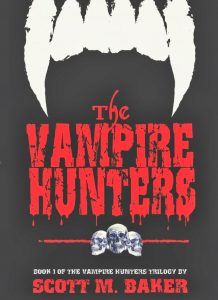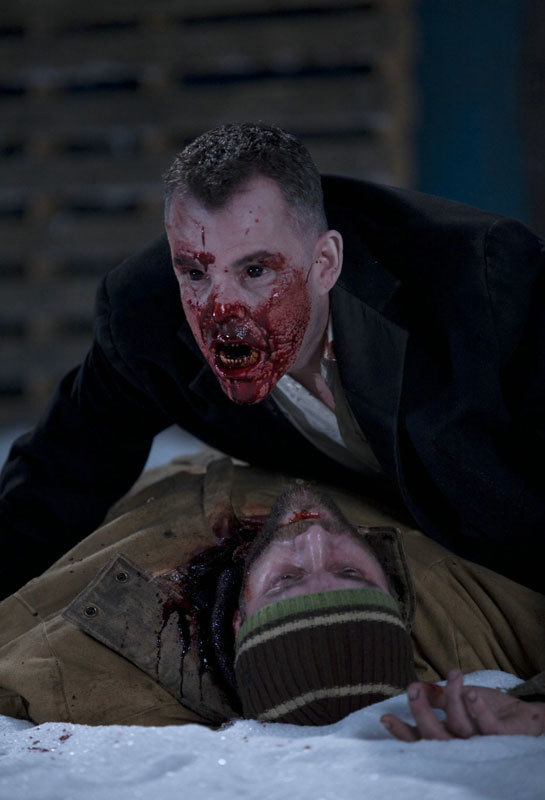Vampires are among the oldest creatures on record. Almost every culture contains legends with a variation of them, in some cases dating back millennium.
Ever since the publication of Bram Stoker’s Dracula, popular culture has embraced vampires. Today there is a wide diversity within the genre, more so than with any other monster.
The gambit runs the range from Anne Rice’s angst-ridden Lestat and Joss Whedon’s vampire with a soul through undead societies trying to coexist amongst humans like in Charlaine Harris’ The Southern Vampire Mysteries or Alison Beightol’s The Primigenio Tales.
The undead have even found a growing niche within the young adult culture. Even though I’m not a fan, no one can take away from the success and popularity of Stephanie Meyer’s Twilight saga or Richelle Mead’s Vampire Academy series.
However, my preference is for the traditional, bad-ass vampires.
You know the ones I’m talking about. Nosferatu, with his rat-like visage and taloned fingers, rising perpendicular out of his coffin or rigidly stalking his victims.
The mutant bloodsuckers from Guillermo del Toro and Chuck Hogan’s The Strain trilogy who strive to turn humans into blood cattle. And my favorites, the pack of vampires that prey on Barrow in 30 Days of Night, hunting humans for sport like they were deer.

One of my favorite vampire moments is when Marlow responds to a victim’s pleas to God for mercy by looking at the heavens, back at the victim, and replies, “No God.”
These are the undead that make us jump in the movie theater, compel us to keep the lights on after we close the book, and make us look over our shoulder when walking along a dark street at night.
The reason we fear vampires derives from the same reason we also admire them – they represent our basest psychological urges. Bram Stoker created the character of Dracula to shine a negative light on the sexual repression of Victorian society. Since then, vampires have come to represent us once the moral and psychological restraints have been removed and we can give free reign to the lust, violence, and narcissism buried deep in our psyches.
There is an innate eroticism to the act when Alexander Skarsgard, Gerard Butler, Frank Langella, or another sensually handsome vampire turn beautiful women. We get a secret thrill when the undead terrorize their way through mankind, whether it’s an isolated vampire on a military base in South Korea or a more global apocalypse in David Wellington’s Bullet series.
When we relate to vampires, it’s because we want to get rid of those inhibitions within ourselves. When we’re scared of vampires, we don’t fear them because they’re monsters, but because they shine a light on our inner selves.
I only made that connection later in life when I was older and (rumor has it) wiser. As a Monster Kid, vampires fascinated me because they were cool. I grew up watching the Universal cache of bad guys, mesmerized as Dracula and Frankenstein terrorized their way across Germany. But what kept me glued to the television screen was whenever CBS Friday Night at the Movies broadcast an old Hammer vampire movie.

The only thing better than Christopher Lee’s snarling rampage through a village (or the buxomy vampiresses he sired) was watching Peter Cushing as Van Helsing battle the bloodsuckers.
Cushing never killed Dracula the same way twice. Sure, all the brides died with the traditional stake through the heart, but he reserved a special demise for the master.
Whether Cushing would slide along a table and rip the curtains off the window, or turn the blades of a flaming windmill to form a cross, he always found a unique and exciting way to kill off the main vampire. And he accomplished his task with the same stoic professionalism in every movie, as if he was born to hunt vampires. He was my action hero before they even became popular.
 It was my love for Hammer’s evil vampire/heroic hunter dynamic that eventually led me to write The Vampire Hunters trilogy. My hunters are taken right from Peter Cushing’s playbook, being tough, action-oriented characters who engage in a life-or-death struggle with the undead.
It was my love for Hammer’s evil vampire/heroic hunter dynamic that eventually led me to write The Vampire Hunters trilogy. My hunters are taken right from Peter Cushing’s playbook, being tough, action-oriented characters who engage in a life-or-death struggle with the undead.
What I really enjoyed writing, however, were the vampires. It gave me a chance to develop vampires that were pure evil with no redeeming qualities, who view humans as nothing more than sexual conquests or a hot meal.
Unlike so many other vampires who are merely two-dimensional figures, mine are complete characters with personalities, back stories, and their own desires. They are an integral to plot as the hunters. I don’t necessarily want readers to like my vampires, but I want them to have an emotional stake (pun intended) in their fates.
Despite what some critics predict, the popularity of vampires in today’s culture will never wane. Certain themes may take center stage for awhile, and that’s a good thing because, no matter what brought you into the genre, once you are hooked on vampires there’s no going back.
So shut down your computer and go to bed (remember, vampires cast no reflection, so you can’t see them in the monitor if they sneak up behind you). Then grab a nice vampire novel and enjoy being scared by things that go bump in the night.
The first book in Scott M. Baker’s The Vampire Hunters trilogy is available on Amazon. He’s available on Facebook and Twitter. Be sure to check out his website, too.

My Vampire Syndrome saga is built on the escalating conflict between the human Vampires and the alien “Pure” vampires. This is a metaphor for how the newer, more ‘human’ vampires of modern novels compare to (and conflict with) the bad-ass bloodsuckers of classic literature.
My human Vampires are not Twilight-style simps, but over the millenia they have learned to hide amongst the normal population and blend in. Obviously, this means they’re not going around biting everything in sight. They are a hybrid subspecies mutated by infusion of the alien Vampires’ DNA, hence the human Vampires call the aliens “Pures.”
With the alien species, I was able to create a Nosferatu-like carnivorous race and have traditional Vampire attributes make scientific sense. Beings who evolved on a planet with full cloud cover would live in darkness and have no evolved resistance to direct UV radiation levels (aka sunlight), and if no acidic plants existed on same planet they have no tolerance for onions and garlic.
And, as anyone who’s watched videos of predatory animals in the wild knows, predators have a clear sense of purpose and acceptance of their own nature, whereas humans tend to be conflicted about their basal instincts (which would only be worse in a vampirized form). Are the real monsters the predators with honor, or the humans whose inner conflicts can drive them to do anything?
Daven, your series sounds interesting. I’ll have to check it out.
Interesting piece. I know there’s debate over the emo/bad-ass vampires. Personally, I think there’s room for both. I do think the emo can be a little overboard but if done right, it addresses one of the things that I’ve always found interesting: If you are changed yet retain the idea of who you were before, what do you do? How do you live a life like that in society (Let the Right One In was a perfect example of that. This is a little girl who could be bad-ass yet incredibly vulnerable emotionally). I think it can add to the story. That drama of now being forced to commit so intimate a violation. How do you deal with what you’ve become. There’s so much material there. Even in the scariest of movies there’s material there. Dracula, for example, straddled both worlds. One could argue that he was evil, but that didn’t stop him from trying to retain a sense of what he was in his former life. To him, the vampirism gave him a power on top of what he was. Adding to that power he so craved. And yet Stoker created a character for the most part ambiguous. We know a little of his history and can tie him to a power hungry monarch of previous centuries but as far as motivation in the story itself we know very little. Which I believe is why Dracula has stood the test of time. It’s a character so open to interpretation that it can be played as effectively by Lugosi, Lee, Langella (ooh, a lot of ‘l’s) and Oldman. Hell, even George Hamilton was able to make it work in a comedy. And that’s how it goes with vampires in general. There are so many legends out there, and it’s so open to interpretation that I think in the end that’s what keeps the genre reinvigorated: The possibilities and the variety. The fact that there are movies like 30 Days of Night, Daybreakers, and books like The Strain (exceptional series) indicate that the bad-ass vampire is out there. As are other interpretations. I say more power to all. Give me a good story and interesting characters and I don’t care what your vampire does.
Laura,
Sorry it took me so long to reply. My apologies.
I agree that’s it’s the diversity if vampires that makes them so enduring. Your point about the various interpretations of Dracula is spot on. The actors who have portrayed him have given him dimensions that are suave, menacing, erotic, and sympathetic while deviating only slightly from the original novel. The sub-genre may cull itself out over time, but it will never disappear.
Great article Scott! Traditional bad ass vampires are awesome!
This part was one of my favorite bits, “The reason we fear vampires derives from the same reason we also admire them – they represent our basest psychological urges. Bram Stoker created the character of Dracula to shine a negative light on the sexual repression of Victorian society. Since then, vampires have come to represent us once the moral and psychological restraints have been removed and we can give free reign to the lust, violence, and narcissism buried deep in our psyches.”
Erin,
I’m glad you enjoyed the article. My wife, who also writes vampire novels, feels that a vampire turning a willing victim is highly erotic. We’re planning on co-authoring a book someday that will be a paranormal vampire romance.